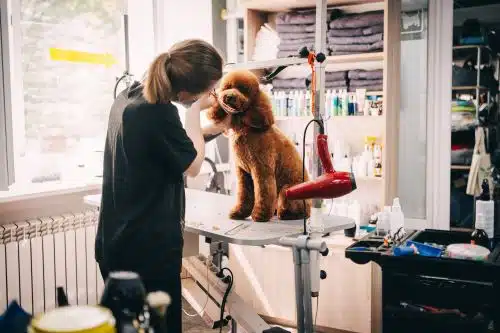North Carolina dog bite laws hold owners strictly liable if a dog deemed dangerous or potentially dangerous bites someone. A dog owner may also be responsible under the legal concept of negligence per se, which usually means that the dog is allowed to run unrestrained in violation of local leash laws.
How do these laws relate to dog groomers who might be bitten during employment? Dog groomers, veterinarians and vet assistants, and other people who regularly work with dogs and other animals often have difficulty suing for dog bites because of a legal defense called “assumption of risk.”
The idea is that a person who works with dogs understands the risk of being bitten and consents to that risk by doing the job. Therefore, it is hard to hold the dog’s owner liable for injuries sustained during employment as a dog groomer.
But as with most legal statutes, there are exceptions in some situations. With “assumption of risk” arguments, there are two possible defenses:
- The dog’s owner hid or didn’t inform the groomer that the dog was especially hazardous. For example, if you know your dog is scared of strangers and tends to bite out of fear, it would be prudent to warn the groomer.
It would also be a good idea to protect the groomer by bringing a muzzle or calling ahead to ask if the groomer has these on hand (some groomers do).
If you say nothing to the groomer about your dog’s propensity for aggression, they may not have known the risk they were assuming. That could make you negligent and liable for their injuries.
- The owner had control of the dog, and the groomer had yet to accept the risk. This might apply if you were waiting in line at the groomer’s office and your dog bit a groomer walking by or if the bite happened in a similar situation.
My Dog Bit the Groomer, What Do I Do?
First, get your dog away from the groomer as quickly as possible to minimize the damage. If you brought a crate or kennel, secure the dog inside.
If not, you may need to put the dog in your car with the air conditioning on and return inside. Ask the groomer if they are all right and if they need medical attention.
If needed, call an ambulance. Stay with the groomer until help arrives, and give them your contact information.
The healthcare provider who treats the groomer will likely contact Animal Control about the dog bite, or the groomer will call them to report it. You should comply with Animal Control’s investigation, including a 10-day quarantine for your dog, even with proof of rabies vaccination.
This is a state law – any time a dog bites a human, it must be quarantined and observed for signs of rabies. If you can meet specific requirements, the Animal Control officer may allow you to quarantine the dog at your home when it must be kept confined and separate from other animals or people.
If the Animal Control officer doesn’t think this will be possible in your home or you don’t meet all the requirements, they might have the dog placed in quarantine at a veterinarian’s office or animal shelter. A veterinarian will check the dog frequently for signs of rabies; if it has no symptoms after ten days, the dog will be released to you.
Can a Groomer Sue You If Your Dog Bites Them?
Unless you have been negligent in some way, probably not; however, you should be honest about your dog’s past behavior when going to a new groomer.
If the dog has any history of aggression around strangers – even if you’ve never known it to bite – you should be very careful when introducing the canine to new people. Let the groomer know that the dog needs time to get used to them, and mention anything that upsets the dog.
For example, “Fluffy really hates for anyone to touch her ears, so please be careful when grooming her head.”
A good groomer will want your dog to be comfortable and take a few minutes to get to know your pet. You might bring some treats your dog likes and ask the groomer to feed some to the dog.
They may also give the dog a chance to sniff them. Remember that most dogs take cues from their humans – if you’re calm and relaxed, it’s more likely that your pet will be, too.
These steps not only help to reduce the risk of a dog bite, but they also make everyone – dog included – more relaxed and comfortable.
Some groomers prefer to work with the dog without an owner present. If this is the case, you should help your dog get accustomed to staying with strangers for a short period of time by leaving them with friends or neighbors for a few minutes.
It’s also a good idea to work with your dog at home beforehand – try touching the dog’s paws so it will be less bothered when the groomer clips its nails. If the dog doesn’t like you handling its paws, you can try giving it a treat while you do this.
What If Your Dog is Very Anxious or Aggressive?
You can help your dog improve its social skills in obedience training classes, which will also give you tools for moderating the dog’s behavior. Dog training classes require owners to be present and dogs to be leashed, so your dog can interact with others in a relatively safe environment.
If your dog is very aggressive, it may need to wear a muzzle until its behavior improves.
Do You Have Questions About a Dog Bite Case?
If a dog has bitten you and you have questions about liability, please contact Tatum & Atkinson at 800-LAW-0804 for a free consultation. We can advise you on any options available for pursuing compensation.

